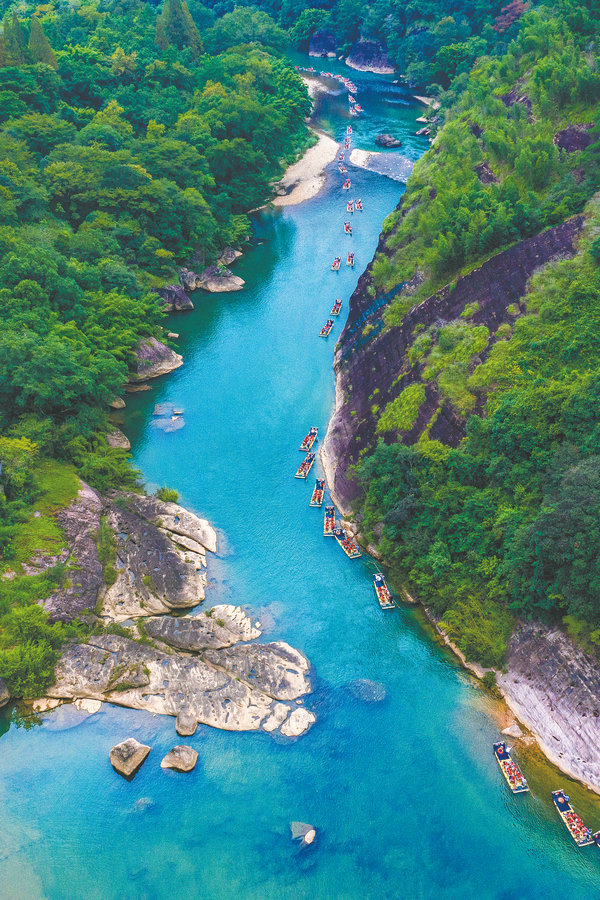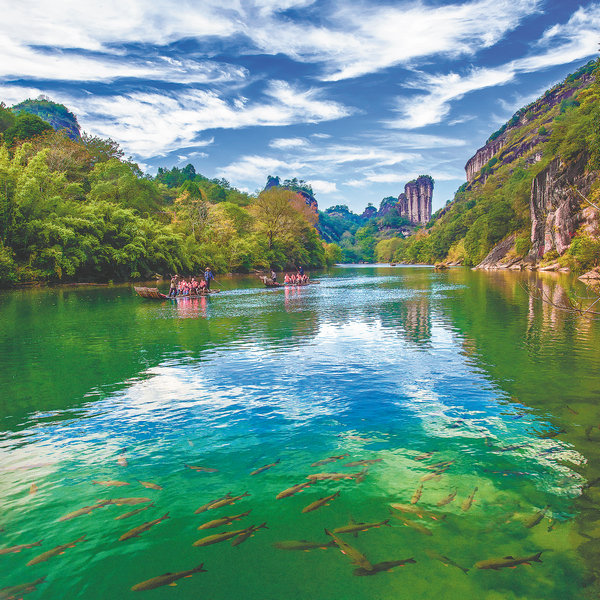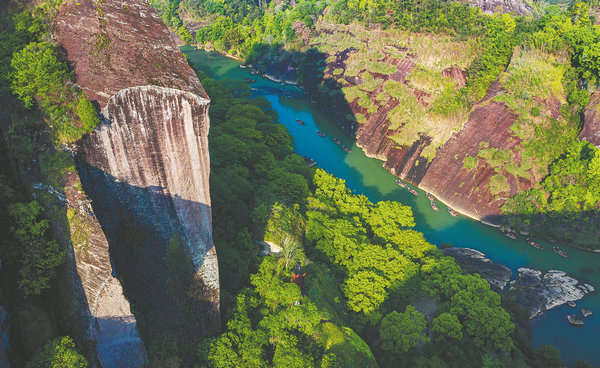
Rafting the Jiuqu River offers a magnificent view of the green mountains and dramatic rocks in Wuyishan, Fujian province. PENG SHAN'AN/HUANG HAI/QIU RUQUAN/FOR CHINA DAILY
Chen Jia's face was awash with a grin for all of the roughly 90-minute raft journey down the Jiuqu (Nine-bend) River that gurgles through a valley beneath the Wuyi Mountains in late December.
The air hung chilly in these highlands in Southeast China's Fujian province, but her smile remained warm, as she used a long bamboo pole to steer the raft while narrating to her five passengers.
Chen has navigated the river for more than two decades. She remained unruffled when the craft occasionally slapped out frothy sprays as it bounced and focused on telling her guests the stories behind attractions along the banks, especially rock formations that resemble humans, creatures or objects.
"That rock there resembles a shy turtle … while legend says those two separated peaks in the distance are a mortal and fairy who engaged in forbidden love and were turned into stone," she tells those onboard.
Chen also knows what lies beneath the surface of the river, which runs from 3 to 30 meters deep along the 9.5-kilometer route.
"The greener the water, the deeper it is," she explains.

Vistas of nature at its most alluring are among the highlights for rafters. PENG SHAN'AN/HUANG HAI/QIU RUQUAN/FOR CHINA DAILY
The ride has long remained a highlight of tours in the Wuyi Mountains. Mount Wuyi was named a UNESCO World Heritage Site in 1999 for its cultural, scenic and biodiversity value.
Chen says about 9,000 visitors take the raft trips in the summer, when more than 20,000 visit the scenic area.
"Many guests have asked us to increase the raft tours, but we have to limit them to ensure the quality of their experiences," she says.
Her father was a raftsman who took her down the river when she was a child.
"In retrospect, I think he might have wanted to show me how beautiful our hometown is," Chen says.
These experiences with her father inspired her to enroll in the bamboo-raft tour guide program at a local mountain-tourism vocational school in 1999.
"It was difficult at first. My hands got blood blisters," she recalls of working after graduation.
"There was extra physical labor. We had to harvest, skin and fire bamboo to make the rafts. And we had to disassemble them every time we finished the route and transport them back to the starting point."
But she'd feel happy when passengers complimented her on the service.
She points out there weren't many women doing the job until about a decade ago, so she often received extra attention.
"We girls wore blue clothes with floral patterns, and foreigners especially enjoyed taking photos of — and with — us," Chen says.

A bird's-eye view of the jade-colored Jiuqu River at Wuyishan National Park. PENG SHAN'AN/FOR CHINA DAILY
Her years on the job have given her the stamina to lead four tours over a 10-hour workday.
"The rafts have also been upgraded in recent years, so they're lighter and float better, and we don't have to put them together and take them apart now."
She has also developed a distinctive style that has made her a star guide, who's often nominated to serve important guests.
"When I first started, I thought it would suffice to just tell tourists the stories about the waters and mountains on both sides of the Jiuqu River," she says.
Now, she also incorporates ecological protection themes and shows how local people and authorities are translating these into wealth. She and her colleagues also retrieve any litter they encounter during tours, she says.
"Over the past decade or so, we've been implementing the policy of returning farmlands to forests," she says.
"I see the water getting clearer and its volume increasing," Chen says.
She points out the improved environment has, in turn, enhanced the quality of another local treasure — tea.
Tea seeps into her narrations onboard the rafts, as do other local cultural legacies like Song Dynasty (960-1279) philosopher Zhu Xi's neo-Confucian thought, and numerous cliff carvings and hanging coffins dating back over 3,000 years.
Nearly 1.3 million travelers took the raft tours from January to November, a 36 percent increase over the same period of 2019, before the pandemic, says Zhang Ruicai, deputy general manager of Wuyi Mountains Tourism Development Co, which oversees the scenic area's operations. Business revenues reached nearly 150 million yuan ($21 million) in the first 11 months of last year, up 43 percent over 2019, he adds.
The river route's nearly 800 bamboo-raft ride guides have each developed their own narration style.
"The content is different for each group of visitors," Chen says.
"We strive to tailor our explanations to their moods and incorporate elements they appreciate."
Chen has received zero complaints throughout her entire career, she says.
Her explanations are humorous and service is thoughtful, which has won recognition from guests from home and abroad, says her colleague, Zhu Jinxing.
"In the beginning, Chen's father held her hand, and she truly inherited essential (tour) narration skills," Zhu says.
"Chen is very adept at explaining human stories, landscapes and cliff carvings. She's insightful and culturally knowledgeable," Zhu says.
Chen was chosen to give a tour to President Xi Jinping during his visit to the national park in March 2021.
Local authorities have combined Xi's important instructions in such aspects as eco-civilization construction, the promotion of cultural inheritance and rural vitalization with the latest local achievements in these areas to present tour-guide narrations and put together a team to share this with visitors to feel the beauty of the Wuyi Mountains.
Chen still has a thick notebook she saved from her student years that's full of tips she used to develop her skills as a guide.
"I think what I need to improve is to be more patient with each group of guests and convey the landscape and culture of the Wuyi Mountains to them … while emphasizing how we, the people of the Wuyi Mountains, protect this land," Chen says.
"I want to share this with them so that they not only marvel at the beauty of the Wuyi Mountains but also take this awareness back with them … to protect their own lucid waters and lush mountains."
Editor Ⅰ: Zhang Wenwen
Editor Ⅱ: Wu Dan
Editor Ⅲ: Liu Guosong














